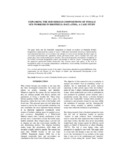Exploring the household compositions of female sex-workers in brothels: Daulatdia, a case study
Abstract
The paper looks into the household composition of female sex-workers in Daulatdia Brothel, Bangladesh to understand the concept of ‘power’ within these households. Based on a limited number
semi-structured interviews of sex-workers, the attempt is to trace power through the three stages of sex-workers professional life: apprentice, tenant, and house-owner, and to examine how class and gender plays roles in this brothel power structure. The research questions conventional ‘victimhood’ of sex-workers in broader Bangladeshi context, and attempts to seek for ‘power’, assuming that within the oppressive patriarchal brothel framework, they exercise power and agency at the level of household in terms of economic independence, motherhood, social mobility, household organization and the struggle for respectability.
It is a revised and shortened version of the author’s dissertation submitted in partial fulfillment of the requirements for the Masters of Arts Degree in Gender and International Development at the University of Warwick, UK in 2002.

